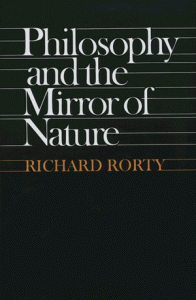
In my attempt to learn a bit more from some “post”-analyitic philosophers, I’ve decided to begin by revisiting Richard Rorty’s Philosophy and the Mirror of Nature ([amazonify]0691020167::text::::sold here[/amazonify]). I rather regret going back to this text before having had direct experience with the work of Heidegger in particular, but I am also displeased that I have yet to read any substantial works from Wilfrid Sellars, David Donaldson, Rudolph Carnap and W.V.O. Quine. However, I suspect that I will be aided by the fact that I have ventured at least gotten my feet wet in exploring John Dewey, Hans Gadamer, Richard J. Bernstein, Quine, and Wittgenstein since i first rushed through parts of Rorty’s work two years ago.
I have chosen to start with Rorty’s Philosophy and the Mirror of Nature for a number of reasons. First, it seems to me something of a seminal work–for Rorty, for philosophy internally, and about philosophy from an external perspective. Rorty’s criticisms are, if I remember well and if my sources are accurate, poignant, reflective, but not pleasing to the ears of most philosophers. As such, he cannot be ignored. Either Rorty’s harsh words are valid and philosophy must reform itself in some dramatic ways or philosophers must make a cogent rejoinder. Since the writing of Rorty’s book, I suspect both have been done with countless subtle incarnations of each, and perhaps some not so subtle.
I have also selected this work for pragmatic reasons, because I think it represents a noteworthy pastiche of early Neopragmatist/postanalytic philosophers’ works (namely Quine, Sellars, and Davidson), as well as those of some of their influences (Wittgenstein, Heidegger, and to some extent Dewey). Furthermore, there is a marked lack of analytic tradition philosopherss in my formal education in philosophy–a deficiency which I hope to allay at least to some degree by reading this work. Finally, I have selected Rorty’s text over those of his peers because the philosophical exploration that I have just begun was encouraged by epistemological criticisms of Rorty’s later work–work which is foreshadowed very strongly in Philosophy and the Mirror of Nature.